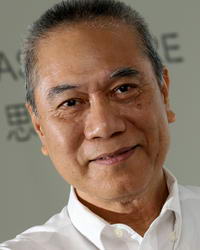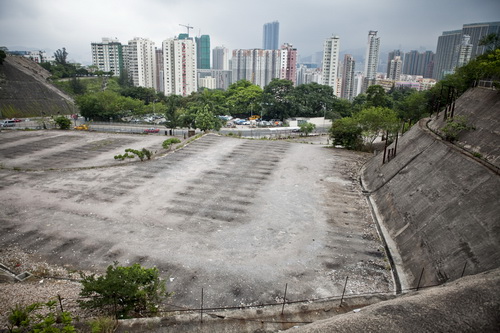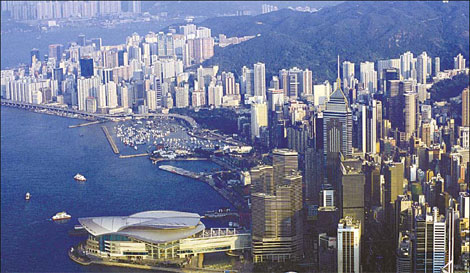Specials
13 years on, Hong Kong seeking her new identity
(chinadaily.com.cn)
Updated: 2010-07-01 10:52
 |
Large Medium Small |
Editor's Note:
Celebrating someone's birthday is a Champagne time - but engineering his or her rebirth certainly isn't.
This is the way Hong Kong is at the moment - marking the 13th anniversary of Britain's handover of the territory to China while desperately seeking a new identity in a rapidly changing country at a rapidly changing time.

HK as financial hub: promise, challenges
This past May, Hong Kong saw local government leaders from the mainland arrive on the heels of one another, hunting for potential investors interested in their respective city projects. Although importing investment was the official theme, it is building respective financial centers that has dominated their agendas.
"Everywhere you go, you hear people talking about building their own financial centers, not what we would have anticipated years ago when few people could make out what a financial center really is," Wu Lianfeng, chairman and managing director of Hong Kong International Po Fung Finance Holdings Ltd, said in an exclusive interview with China Daily. Full story
City's logistics sector may be challenged
Increasing offshore trade may pose a threat to Hong Kong's status as a logistics hub, with direct shipment, a shipping arrangement skipping Hong Kong as a transshipment station, expected to show strong growth momentum in the next three years, according to the latest survey by the Hong Kong Trade Development Council (HKTDC).
This could be bad news for the city that counts on trading and logistics as one of its economy's four traditional pillar industries. Full story

Hong Kong 'directionless'
 Lau Nai-keung believes Hong Kong's economy has lost its way since the handover from Britain 13 years ago this week.
Lau Nai-keung believes Hong Kong's economy has lost its way since the handover from Britain 13 years ago this week.
The leading economic commentator says the special administrative region needs to find a proper role in the global economy.
"We have sort of lost our direction now and so has the government so we don't know where to go or what to do," he said.
The 62-year-old was speaking in the Wan Chai offices of the Hong Kong Ideas Centre, a think tank for which he is an adviser.
Although he is known as a writer and radio talkshow host, he was for 20 years a member of the Chinese People's Political Consultative Conference (CPPCC).
Lau blames the Hong Kong Special Administrative Region government led by Chief Executive Donald Tsang for allowing the economy to be hijacked by property tycoons.
 |
|
The junction of Fat Kwong St and Chung Hau St (auctioned as Kowloon Inland Lot No.11175) covers some 16,151 square meters of land in Ho Man Tin, Hong Kong. The SAR government sold the site for HK$10.9 billion, beating the HK$8.41 billion median estimate of seven analysts surveyed by Bloomberg. [THOMAS LEE / BLOOMBERG] |
He insists the SAR's leaders are just standing by as moguls who own the huge shopping malls and other commercial properties exert huge influence. Full story
'HK seeks a new identity'
|
 |
| An aerial view of the Hong Kong Convention and Exhibition Center, where the ceremony took place 13 years ago for the hand over of Hong Kong to Chinese control. Also visible are Victoria Harbor and other landmark buildings. Provided to China Daily |
The city, or rather the Hong Kong Special Administrative Region, has been one of the most successful economies in Asia.
But now, due partly to the worldwide recession and partly to China's greater openness to global business, weaknesses seem to be mounting below its glamorous surface. Full story
Services-dependent
Fang Zhou, assistant chief research officer of the think tank One Country Two Systems Research Institute (OCTSRI), says there is a challenge.
 "Hong Kong is one of the most service-sector dependent economies in the world and some people say it is a real weakness. It makes us extremely vulnerable and that has been the case over the last two years with the economic crisis affecting financial institutions," he said.
"Hong Kong is one of the most service-sector dependent economies in the world and some people say it is a real weakness. It makes us extremely vulnerable and that has been the case over the last two years with the economic crisis affecting financial institutions," he said.
Although the economy contracted by 3.1 percent in 2009, Hong Kong's financial services sector has proved more resilient than other financial centers such as London and New York. The forecast for growth this year is 4 to 5 percent in real terms.
The Hong Kong SAR government is to some extent now trying to turn back the clock and diversify the economy. As a result of policies pursued in the 1980s to shift production of goods to the mainland and, in particular, Shenzhen over the border, manufacturing now makes up only 2.5 percent of the economy. Full story
Important bridge to mainland
Helen Chan, the Hong Kong government's economist, said the SAR is still a very important bridge to the mainland. "Many people worried about Hong Kong SAR losing out its middleman role after China's accession to the World Trade Organization in 2001 but in fact the region continues to play a very important role as an entry point between China and the rest of the world."

She rejected the idea the economy was too reliant on its financial sector, stating that it made up only 16 percent of the economy and insisted trade, benefiting from Hong Kong's free port status and making up 28 percent of the economy, remained a real driving force.
She was adamant a lot of the critics of the balance of Hong Kong's economy ignored the fact there was a synergy between the SAR as a financial and service center and the manufacturing which takes place in Guangdong province.
"I think it is a perfect partnership between Hong Kong's service sector expertise and the mainland's industrial powerhouse. It is where our competitive advantage lies," she said. Full story

CEPA & IVS
CEPA was the first free trade agreement signed between Hong Kong and the mainland. The two parties first agreed the main text of the accord in June 2003 then ratified seven supplements to broaden and enrich its content through continuous and further reciprocal liberalizations.
The Trade and Industry Department of the Hong Kong government recently updated the statistics of the CEPA contribution to the Hong Kong economy since 2003.
Since the inception of the IVS, the scheme has been extended to 49 mainland cities. By March 2010, 49 million mainland tourists had visited the city under the scheme. The number of mainland IVS tourists grew at an average annual rate of 20 percent from 2004 to 2009. During the same period, the mainland IVS visitors brought about additional spending totaling more than HK$84.8 billion in the city. Full story
HK attracts luxury spenders
Whenever you take a stroll in the flagship stores of luxurious brands such as Louis Vuittion in Central, or the jewelry shops in Mongkok, or even the health and beauty chains of Watsons or Mannings, you will always find mainland visitors on a spending spree.
Everyone is realizing the increasing importance of mainland visitors in the Hong Kong retail market. This is one of the manifestations of the increasing economic interactions between Hong Kong and the mainland. Full story
Mainland visitors eye financial assets in HK
The mainland visitors are not only just shopping for consumer durables, they are also eyeing up financial assets such as stock and property in the city. Some mainland visitors have taken the opportunity to purchase local properties after finishing their regular shopping in the city, a local property agent said.
Benny Sham, manager of 18 Property Agent Ltd, told China Business Weekly that the mainland tourists were each spending HK$6 million to HK$10 million to purchase apartments of 800 to 1,000 square feet for investment purposes.
"Between 2009 and 2010, there were dozens of property deals by mainland visitors executed by 18 Property Agent Ltd. We noticed that the number of mainlanders buying property in 2010 had increased compared with 2003 when the Individual Visitor Scheme (IVS) was first instigated." Shum said. Full story
China may allow yuan stock funds in HK
Five to six Chinese brokerages and fund management companies may on a trial basis win approval to set up yuan-denominated funds in Hong Kong that invest in the mainland stock market, the China Securities Journal reported. Full story
RMB business expansion reinforces HK as int'l financial hub
Renminbi (RMB) business in Hong Kong is of strategic importance to both China's mainland and Hong Kong, and the expansion of RMB business will help reinforce Hong Kong's position as an international financial center, said Hong Kong's Secretary for Financial Services and the Treasury in London. Full story
HK Pavilion at Expo
Total admissions to the Hong Kong Pavilion and Hong Kong's Urban Best Practices Area (UBPA) Exhibition at World Expo 2010 Shanghai China (Shanghai Expo) has topped the one million mark, said the Hong Kong Special Administrative Region (HKSAR)'s government.
Since the opening of the Shanghai Expo on May 1, the Hong Kong Pavilion has received on average more than 10,000 visitors a day while the UBPA Exhibition has seen about 8,000 visitors a day. Full story